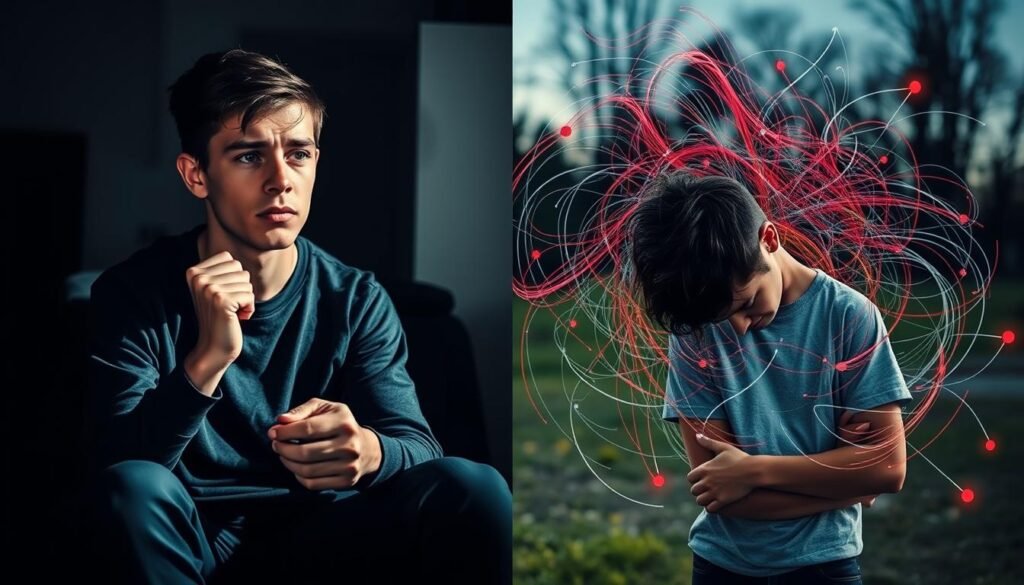About 8% of children and teenagers in the US face anxiety disorders. The situation has worsened due to the COVID-19 pandemic. Teen years bring a lot of stress, leading to significant changes in behavior and mental health. It’s vital for parents and caregivers to recognize teen anxiety signs. Early help can truly change the lives of these young people.
Anxiety in teens can show up in many ways, from feeling very worried to having physical problems. With more teens feeling overwhelmed, finding anxiety help for young adults is key. Challenges like school pressure, social media, and big world problems can cause noticeable symptoms. Spotting these early is crucial for timely help and supporting teens’ mental health.
Key Takeaways
- Approximately 8% of children and teenagers experience anxiety disorders.
- Common anxiety symptoms in teens include irritability, difficulty concentrating, and physical aches.
- Teenage anxiety can be triggered by academic, social, and personal pressures.
- Seeking help early can prevent complications like depression and long-term mental health issues.
- Effective treatment options include cognitive behavioral therapy and relaxing techniques.
Understanding Anxiety Disorders in Teens
Anxiety disorders are a big issue for teens, showing up as generalized anxiety, social anxiety, and panic disorder. Knowing about these can help spot symptoms and find the right teenage anxiety treatment.
Being a teenager brings challenges, often leading to anxiety in youth. Anxiety usually comes from school pressures, fitting in, and fear of being judged. This can turn into social phobia, where the fear of judgment causes teens to pull away from social activities.
Panic disorder hits girls more often than boys, often starting between 15 and 19 years old. Middle school brings a spike in skipping school due to worry about grades and fitting in. Anxiety can lead to mood disorders, eating issues, or self-harm.
Young teens might show separation anxiety, not wanting to go out or do things alone. Some research points to anxiety being partly genetic. This means being nervous or shy could be inherited, raising the chance of adolescent anxiety disorder.
In the US, nearly 32% of teens face anxiety disorders, with many suffering severe effects. It’s crucial to address and treat these disorders early on for better outcomes.
Prevalence of Anxiety Symptoms in Youth
Teen anxiety is growing in our society. Mental health stats show more adolescents now suffer from anxiety disorders. About 15% to 20% of children and teens face anxiety symptoms, with numbers reaching up to 31.9% for ages 13 to 18. It’s important to know how common anxiety is among the youth.
There’s a big difference between girls and boys when it comes to anxiety. Girls experience it more, with rates at 38.0%, while boys are at 26.1%. These differences might be because of society and how each gender grows up. The data tells us that anxiety does not pick an age group; it affects many teens.
If we don’t treat anxiety disorders, they can cause big problems later. These problems include doing poorly in school, having trouble with friends and family, and even more mental health issues like depression. Worse, most teens don’t get the help they need. We must recognize how widespread teen anxiety is. This way, we can better support our kids who are dealing with it.
Anxiety Symptoms in Teens: Know the Warning Signs
It’s important to know the warning signs of anxiety in teenagers. Many teens face more anxiety today because of school and social media. Knowing these signs helps parents and caregivers see when their child needs help.
Here are some common symptoms:
- Recurring fears that disrupt daily living
- Irritability and mood swings
- Trouble concentrating on tasks
- Extreme self-consciousness in social situations
- Social withdrawal, leading to isolation
- Avoidance of new experiences or activities
- School refusal or reluctance to attend
- Use of substances, such as marijuana, to cope with anxiety
Anxiety shows up in different ways in teens. Panic disorder, for example, affects girls more and usually starts in late adolescence. This can lead to serious issues like not wanting to go to school or not wanting to leave home.
Anxiety doesn’t just make you feel bad. It can also make it hard for teenagers to do well in school or to make friends. This is why understanding both anxiety and depression is key. Studies show that over 32% of U.S. teens deal with anxiety disorders, with a lot of them having severe problems because of it.
Here’s a table that highlights some key anxiety symptoms and what they can lead to:
| Symptom | Potential Implications |
|---|---|
| Recurring fears | Disrupted daily functioning |
| Irritability | Social conflicts and strained relationships |
| Trouble concentrating | Academic struggles and reduced performance |
| Social withdrawal | Isolation and loneliness |
| Avoidance of new situations | Missed opportunities for growth |
| Substance use | Long-term negative consequences on health |
| School refusal | Decline in academic achievement |
Being aware of these signs is vital. By recognizing them, we can help teenagers get the support they need. With the right help and awareness, we can reduce the risks of anxiety. This allows teens to deal with their problems better.
Common Symptoms of Anxiety in Adolescents
It can be hard to spot anxiety in young people. They may show emotional, behavioral, or physical signs of stress. Knowing these can help us find and help them early.
Physical Symptoms
Anxiety sometimes looks like common health problems. This might include:
- Frequent headaches
- Sleep problems like insomnia or sleeping too much
- Muscle tension or pain
- Stomachaches or other unexplained physical issues
These troubles may make teens worry they’re very sick. This fear makes it hard for them to talk about their stress.
Emotional Symptoms
Teens with anxiety often worry a lot or get easily upset. They may show:
- Constant worrying about things that might happen or things they’ve done
- Irritability or quick mood changes
- Being very scared about their safety
- Worrying a lot about school or how well they do things
Feeling nervous about fitting in is also typical in anxious teens.
Behavioral Symptoms
Anxious feelings can change how teens act. They might:
- Avoid places or events that make them anxious, like parties or school
- Pull away from family or friends
- Need a lot of reassurance from adults
These signs could mean they have Generalized Anxiety Disorder (GAD). Getting professional help like counseling is key. Supportive resources for parents are available at this link.

Teen Anxiety Signs: When to Be Concerned
Anxiety is a normal part of growing up. It shows up in many ways as kids turn into teenagers. But not all anxiety is cause for concern. There are certain signs that tell you when anxiety in teens is serious. If anxiety stops them from doing everyday things, it might mean they need extra support.
Knowing the signs of serious anxiety is key. Look out for these warnings in teens:
- They pull away from friends and family
- Grades start to slip unexpectedly
- They worry too much about daily stuff
- Unexplained headaches or stomach pains happen
- Sleeping too little or too much becomes common
- Mood swings and irritability increase
If these issues don’t go away, it’s essential to act. Reach out to school counselors or mental health experts. When to worry about teen anxiety depends on how long and strongly they feel these things. For example, if fear or anxiety affects their daily life, it’s time to seek help.
About 1 in 3 teens will deal with an anxiety disorder. Shockingly, 80% don’t get the help they need. This can lead to their symptoms getting worse. The rise in teens being hospitalized for suicidal thoughts in the last ten years shows how crucial it is to notice warning signals in teenagers early.
Here’s a closer look at symptoms related to anxiety:
| Sign/Symptom | Description | Professional Help Needed |
|---|---|---|
| Social Withdrawal | Avoidance of social activities, including friendships. | Yes |
| Academic Decline | A drop in grades or disinterest in school. | Yes |
| Physical Complaints | Health problems with no known cause, like stomachaches. | Yes |
| Sleep Disturbances | Trouble sleeping or sleeping too much, affecting daily life. | Yes |
| Persistent Worry | Constant fear over regular situations. | Yes |
Causes of Anxiety in Teens
Anxiety in teens comes from many sources. These affect their mental health and happiness. Academic stress and social media are big causes. Knowing why teens feel anxious allows us to help them better.
Academic Pressures
Striving for top grades can stress teens out. They often feel pushed to excel in school. This stress can make them very anxious. Reasons for this pressure include:
- Parental expectations
- Competitive school environments
- Standardized testing
- Extracurricular commitments
Worrying about grades can hurt a teen’s mental health. It can lead to depression and anxiety. You can learn more about academic stress and teens by visiting this source.
Social Media Influence
Social media also adds to teen anxiety. Teens face pressure to look perfect and be popular online. This can make them feel bad about themselves. Social media can make teens feel stressed in many ways:
- Comparison to peers
- Online bullying
- FOMO (Fear of Missing Out)
- Unrealistic body standards
This stress is serious, and guardians need to understand its effects. It’s important to encourage healthy social media habits and positive self-esteem in teens.
The Effects of Anxiety on Teenagers
Anxiety disorders hit teens hard, affecting all parts of their lives. About 1 in 3 teenagers deal with an anxiety disorder. Most of them say anxiety and depression are big problems among friends. Because of anxiety, grades can drop as teens skip school or stress over tests. They might also feel sick more often, with stomachaches, headaches, and tense muscles messing up their day.
Feeling anxious can make it tough for teens to hang out with friends or stay calm. It’s hard for them to focus on homework, too. Teens struggling with anxiety are more likely to use drugs, which is worrying. They are twice as likely as other teens to misuse drugs. This shows why we need to help teens with anxiety fast, to keep them safe from addiction.
Anxiety is often linked to depression, especially generalized anxiety disorder. It’s important to treat it early. Cognitive Behavioral Therapy (CBT) is a good way to help. It teaches teens to see anxiety differently and find ways to cope. With anxiety on the rise, especially with COVID-19 and social media stress, understanding and helping teens is key for their health.
| Aspect | Impact |
|---|---|
| Academic Performance | Declines in grades, school refusal |
| Social Interaction | Withdrawal from activities, irritability |
| Physical Health | Stomachaches, headaches, muscle tension |
| Mental Health | Increased risk of depression, substance abuse |
| Common Symptoms | Recurring fears, sleep problems, concentration issues |
Teenage Anxiety Treatment Options
Treating anxiety in teenagers involves several steps. It combines therapy with lifestyle changes. Around 60% of teens with anxiety don’t get the help they need. This shows why effective help is crucial. Cognitive behavioral therapy (CBT) is a key treatment. This therapy works well, especially with medication.
Doctors often prescribe SSRIs for teen anxiety. These are the most used treatment for these disorders in young people. If SSRIs don’t work, SNRIs might be tried. Benzodiazepines are another option for tough cases, but doctors are careful with them.
The table below summarizes various treatment options and their characteristics:
| Treatment Method | Description | Effectiveness |
|---|---|---|
| Cognitive Behavioral Therapy (CBT) | A structured program helping teens identify and change negative thought patterns. | Highly effective for treating anxiety disorders. |
| SSRIs | The most common medication for treating anxiety, known for balancing brain chemicals. | Effective for many, though side effects like dizziness and headaches may occur. |
| SNRIs | An alternative to SSRIs for patients not responding to the initial treatment. | Useful for a second option in managing symptoms. |
| Benzodiazepines | Medications designed for short-term relief of severe anxiety symptoms. | Effective but used with caution due to potential for dependency. |
| Self-Care Techniques | Incorporates healthy lifestyle choices like physical activity and stress reduction. | Supports overall well-being and complements professional treatments. |
Only Cymbalta (duloxetine) is FDA approved for treating anxiety in kids 7 and up. It’s important to know the risks of medications. The FDA has warned about increased suicidal thoughts in teens from some antidepressants. A good treatment plan needs a professional’s evaluation. This is important if there are other issues like ADHD or depression.

Looking at all treatment options helps improve teens’ lives. Combining therapy with self-care makes for a thorough plan. This approach deals with anxiety’s complex nature.
Managing Teen Anxiety: Effective Strategies
Helping teens handle anxiety combines self-care and professional guidance when needed. Knowing effective techniques can greatly help teens. They learn to manage tough situations better.
Self-Care Techniques
Self-care is key in reducing anxiety for teens. Here are main ways to boost emotional health:
- Regular physical activity: Exercise helps release endorphins, lowering stress.
- A balanced diet: Good nutrition supports better emotional control, building resilience.
- Practice slow breathing: This method reduces stress hormone levels, helping teens stay calm.
- Confronting fears: Tackling anxiety triggers directly often works better than avoiding them.
- Developing a growth mindset: Seeing challenges as growth chances can ease anxiety.
Professional Help
When anxiety gets too much, it’s important to seek professional support. Here are important options:
- Cognitive-Behavioral Therapy (CBT): CBT is great for teens with anxiety. It focuses on changing negative thoughts.
- School counseling services: Schools often have counselors who offer help in tough times.
- Family therapy: Having family support can make teens feel safer as they deal with anxiety.
- Medication: Medication might help some teens if their anxiety is intense. Always talk to a doctor first.
Using these strategies takes time and effort. Recognizing what triggers anxiety and knowing how to cope with it empowers teens. This boosts their confidence in handling emotional challenges.
Anxiety Coping Strategies for Teens
Teenagers often deal with stress from different areas in their lives. It’s vital to know how to manage this anxiety. By using certain strategies, teens can lower their stress and become more resilient. These methods help them with academic and social pressures.

- Mindfulness and meditation practices promote relaxation.
- Grounding exercises, including the 5-4-3-2-1 method, help regain control over emotions.
- Deep breathing exercises, such as the 4-7-8 method, are useful for acute anxiety management.
- Encouraging positive self-talk and reframing negative thoughts can reduce feelings of anxiety.
- Art and music therapy allow teenagers to express emotions non-verbally.
Teens should know about thought distortions. These are harmful ways of thinking like all-or-nothing or personalizing problems. Tackling these thoughts can reduce anxiety about their self-image.
Anxiety can show up as physical signs, like feeling butterflies in your stomach or having trouble breathing. Dealing with these symptoms through coping strategies can make teens feel more in control. This empowers them to handle their feelings better.
Peer support is also very helpful for teens with anxiety. Joining groups where they can share and find support makes a big difference. Regular practice of these methods is key. If anxiety gets too hard to handle, seeking help from professionals is important. For more help, tools like the teenage anxiety test are great for understanding stress levels.
Conclusion
It’s crucial to understand anxiety in teens. Around 31% of adolescents face anxiety disorders. But only 18% get help, leaving many untreated.
They might show signs like being irritable, losing focus, or often feeling sick. Recognizing these early can help a lot.
Anxiety can hit a teen’s grades, friendships, and happiness hard. Knowing the signs and offering support is key. A caring environment helps teens heal faster.
It’s vital kids feel okay asking for help. This could mean talking, meds, or simple self-care. Support from family and friends makes a big difference. This kind of support leads them to a brighter, stronger future.